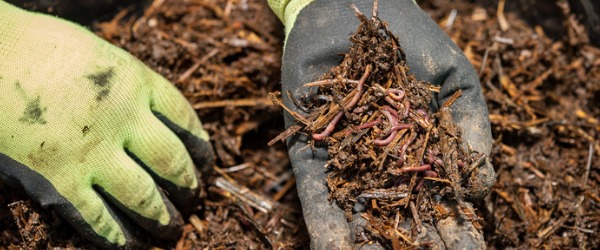What is a Vermiculturist?
A vermiculturist is someone who is a worm farmer (who breeds worms), and uses the worms to convert waste products such as uneaten food, feces, grass clippings, and spoiled fruit and vegetables into healthy, nutrient-rich soil and organic fertilizer. As consumers are buying more and more organic produce, farmers are needing more and more organic fertilizers.
Terms used:
Vermiculturist - worm farmer
Vermicompost - the product of composting using earthworms
Vermicomposting - the process of producing vermicompost
Vermicast - worm castings (or worm manure); the end product by an earthworm. These casts contain five times the nitrogen of ordinary soil, seven times the phosphorus, eleven times the potash, two times the calcium and magnesium, and eight times the actinomycetes (useful bacteria).
Windrows - rows of bedding material and organic matter that the earthworms live in (these windrows act like a bin without a physical barrier). Typically, windrows are approximately four to ten feet wide, by two to three feet high, with varying lengths.
Red Wiggler - one of the earthworm species most often used for composting
What does a Vermiculturist do?

Vermicomposting can be done on a large scale, or a small scale. The most common earthworm used for vermicomposting is the Red Wiggler. They feed most rapidly at temperatures of about 15–25°C, and can survive at 10°C. Temperatures above 30°C may harm them. Vermicompost is ready for harvest when it contains few, if no scraps of uneaten food.
Large scale vermicompost is used for landscaping, farming, or for sale, and the vermiculturist on this farm may also produce worms to sell for small-scale vermicomposting businesses, or for bait. Windrows (rows of bedding material and organic matter) are sometimes used for large scale operations, and placed on concrete slabs to avoid predators. The earthworms have no desire to escape from the windrow as there is always a constant supply of organic matter for them to go through. Another method is the flow through system (or raised bed system), and is usually the choice of method for indoor facilities, and/or for colder climates. Here, the earthworms are given an inch of waste/organic matter across the top and since they are surface dwellers, they constantly move towards the food source. By pulling a breaker bar across the mesh screen from below, an inch of castings are harvested, thereby eliminating the need to separate the worms from the castings.
Food waste used for large scale operations:
- grass clippings
- wood chips
- agricultural waste
- cow or pig manure
- cafeteria waste
- grocery waste
- food processing waste
For small scale vermicomposting, old plastic, styrofoam, metal or wood containers can be used. There are also a variety of bins to choose from that are commercially sold. Plastics bins are ideal, as wooden bins will need to be replaced from eventual decay. If the vermiculturist chooses to keep the bin outside, it should be in a sheltered spot, positioned away from direct sunlight, and insulated during the winter months.
Food waste used for small scale operations:
- coffee grounds and filters
- tea bags
- rinsed eggshells
- fruits & vegetables (including peels)
- grains (breads, cereal, crackers)
- leaves
- grass clippings
Benefits of vermicompost:
- enriches soil with micro-organisms
- castings are 10-20 times higher in microbial activity than organic matter ingested
- worm castings contain worm mucus which helps to hold moisture better than plain soil
- improves aeration of soil
- encourages root growth
- encourages plant growth and structure
- helps germination and crop yield
- attracts earthworms that are deep-burrowing
- reduces waste flow to landfills
- production reduces greenhouse gas emissions
- vermicomposting is beneficial to the environment, and a low cost investment
What is the workplace of a Vermiculturist like?
While many vermiculturists are self-employed, they may also work in farms that create mass amounts of vermicompost. Worms can be shipped to buyers who want to make their own compost, or farmers and gardeners will purchase the castings or compost mix.
Vermiculturists are also known as:
Worm Farmer
Professional Worm Farmer